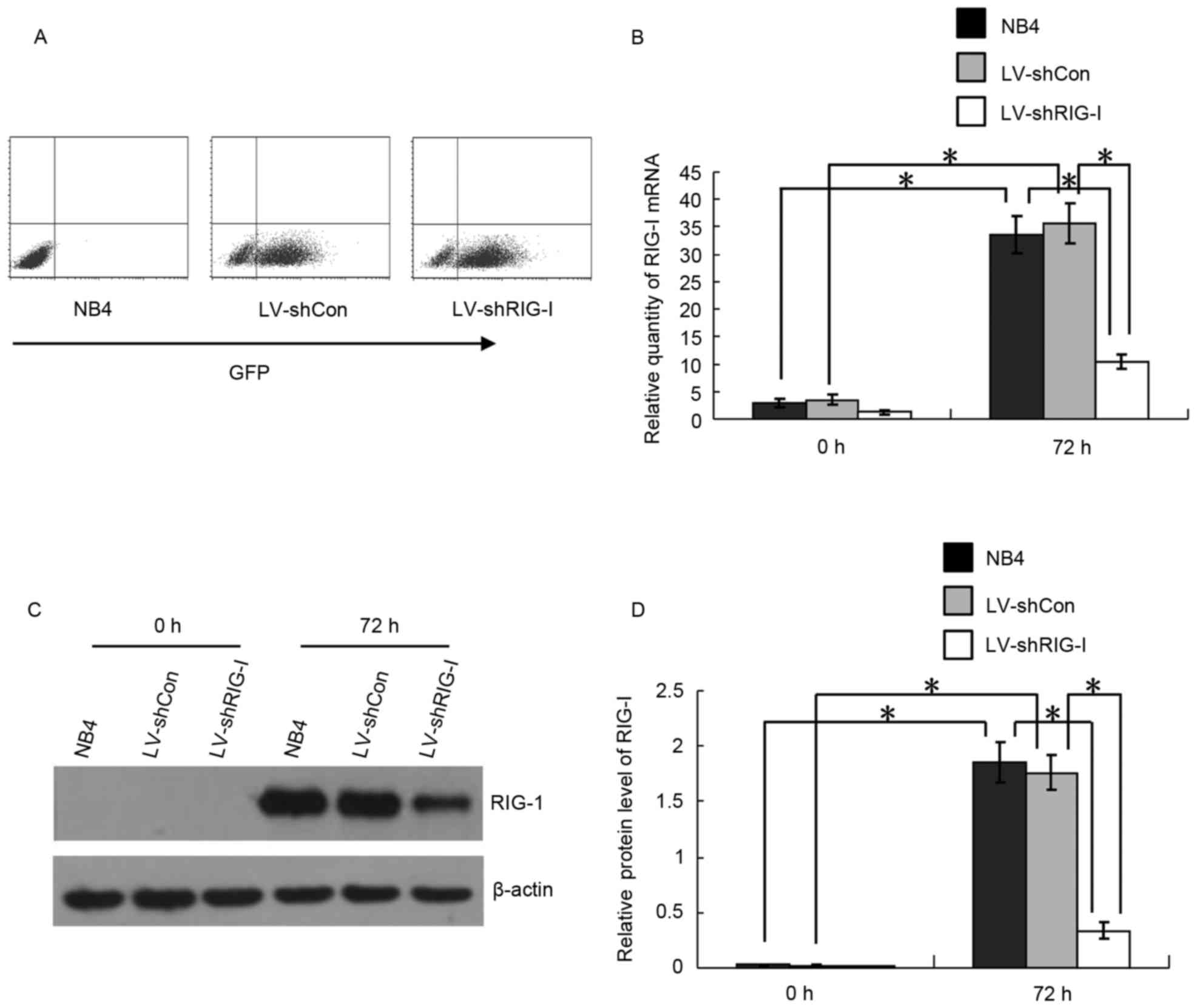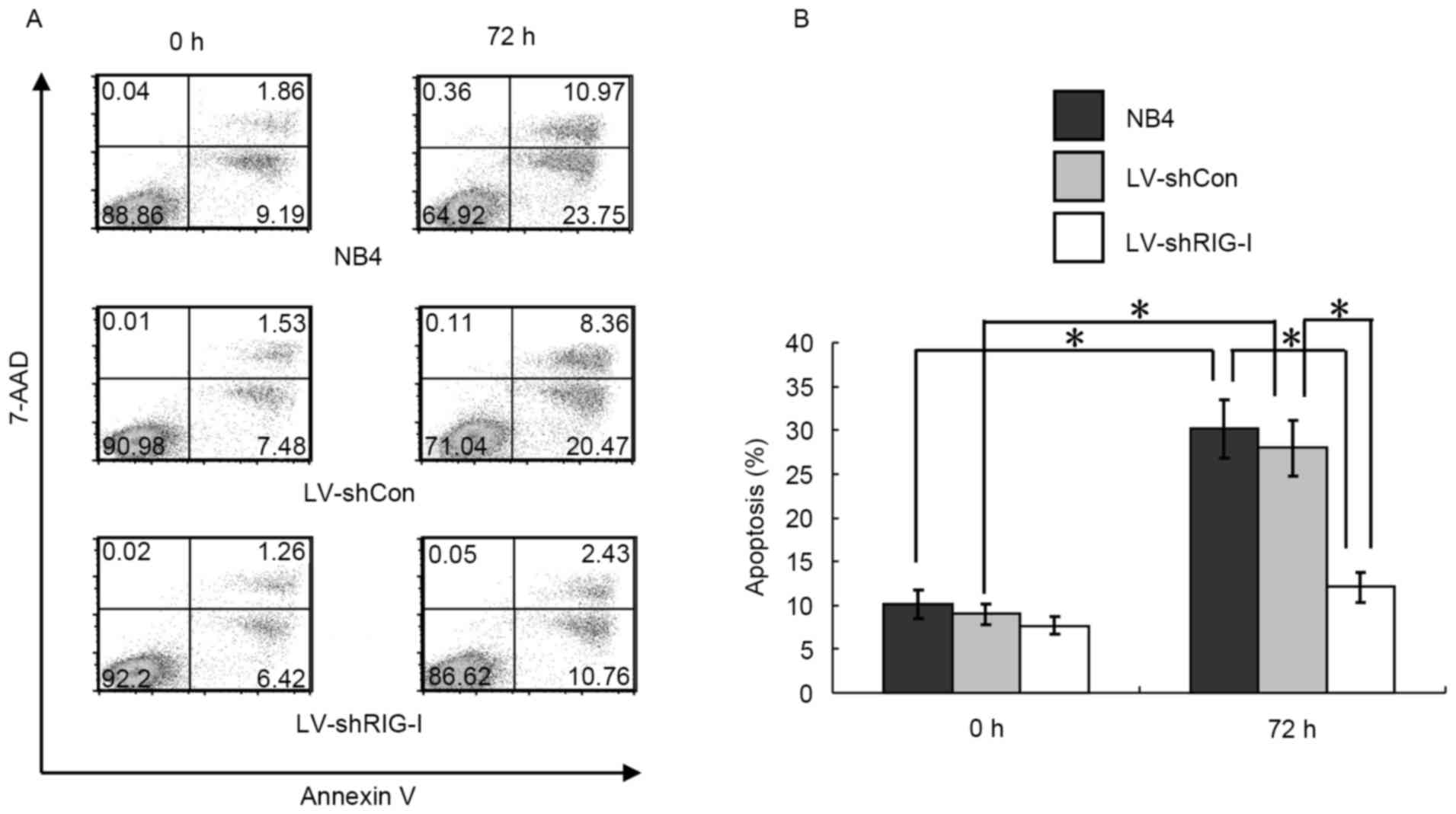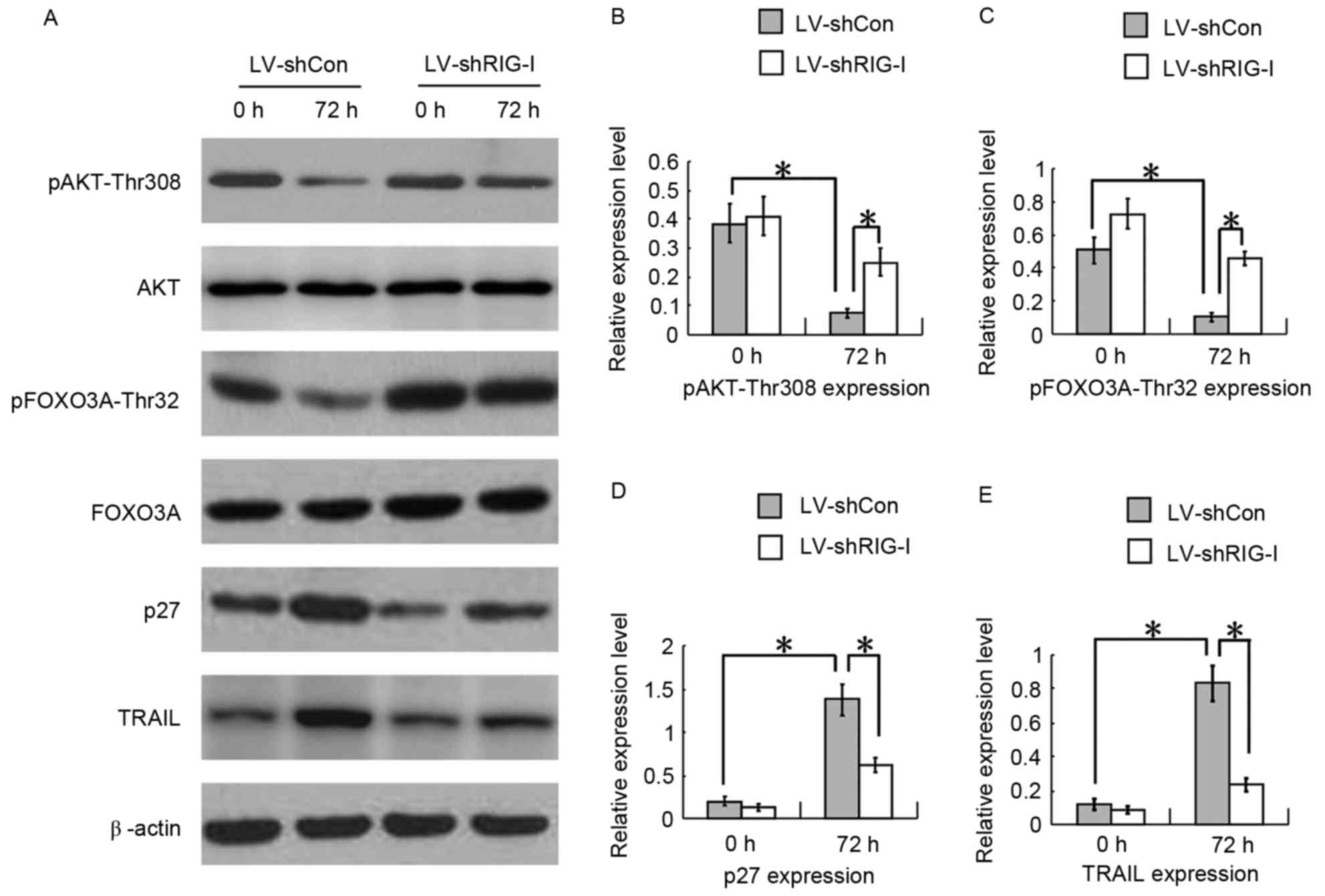|
1
|
Wang ZY and Chen Z: Acute promyelocytic
leukemia: From highly fatal to highly curable. Blood.
111:2505–2515. 2008. View Article : Google Scholar : PubMed/NCBI
|
|
2
|
Liu TX, Zhang JW, Tao J, Zhang RB, Zhang
QH, Zhao CJ, Tong JH, Lanotte M, Waxman S, Chen SJ, et al: Gene
expression networks underlying retinoic acid-induced
differentiation of acute promyelocytic leukemia cells. Blood.
96:1496–1504. 2000.PubMed/NCBI
|
|
3
|
Zhang NN, Shen SH, Jiang LJ, Zhang W,
Zhang HX, Sun YP, Li XY, Huang QH, Ge BX, Chen SJ, et al: RIG-I
plays a critical role in negatively regulating granulocytic
proliferation. Proc Natl Acad Sci USA. 105:10553–10558. 2008.
View Article : Google Scholar : PubMed/NCBI
|
|
4
|
Yoneyama M, Kikuchi M, Natsukawa T,
Shinobu N, Imaizumi T, Miyagishi M, Taira K, Akira S and Fujita T:
The RNA helicase RIG-I has an essential function in double-stranded
RNA-induced innate antiviral responses. Nat Immunol. 5:730–737.
2004. View
Article : Google Scholar : PubMed/NCBI
|
|
5
|
Zeng W, Sun L, Jiang X, Chen X, Hou F,
Adhikari A, Xu M and Chen ZJ: Reconstitution of the RIG-I pathway
reveals a signaling role of unanchored polyubiquitin chains in
innate immunity. Cell. 141:315–330. 2010. View Article : Google Scholar : PubMed/NCBI
|
|
6
|
Loo YM and Gale M Jr: Immune signaling by
RIG-I-like receptors. Immunity. 34:680–692. 2011. View Article : Google Scholar : PubMed/NCBI
|
|
7
|
O'Neill LA and Bowie AG: The power stroke
and camshaft of the RIG-I antiviral RNA detection machine. Cell.
147:259–261. 2011. View Article : Google Scholar : PubMed/NCBI
|
|
8
|
Yoo JS, Kato H and Fujita T: Sensing viral
invasion by RIG-I like receptors. Curr Opin Microbiol. 20:131–138.
2014. View Article : Google Scholar : PubMed/NCBI
|
|
9
|
Chiang JJ, Davis ME and Gack MU:
Regulation of RIG-I-like receptor signaling by host and viral
proteins. Cytokine Growth Factor Rev. 25:491–505. 2014. View Article : Google Scholar : PubMed/NCBI
|
|
10
|
Jiang LJ, Zhang NN, Ding F, Li XY, Chen L,
Zhang HX, Zhang W, Chen SJ, Wang ZG, Li JM, et al: RA-inducible
gene-I induction augments STAT1 activation to inhibit leukemia cell
proliferation. Proc Natl Acad Sci USA. 108:1897–1902. 2011.
View Article : Google Scholar : PubMed/NCBI
|
|
11
|
Li XY, Jiang LJ, Chen L, Ding ML, Guo HZ,
Zhang W, Zhang HX, Ma XD, Liu XZ, Xi XD, et al: RIG-I modulating
Src-mediated AKT activation to restrain leukemic stemness. Mol
Cell. 53:407–419. 2014. View Article : Google Scholar : PubMed/NCBI
|
|
12
|
Huang H and Tindall DJ: Dynamic FoxO
transcription factors. J Cell Sci. 120:2479–2487. 2007. View Article : Google Scholar : PubMed/NCBI
|
|
13
|
Sakoe Y, Sakoe K, Kirito K, Ozawa K and
Komatsu N: FOXO3A as a key molecule for all-trans retinoic
acid-induced granulocytic dirreretiation and apoptosis in acute
promyelocytic leukemia. Blood. 115:3787–3795. 2010. View Article : Google Scholar : PubMed/NCBI
|
|
14
|
Livak KJ and Schmittgen TD: Analysis of
relative gene expression data using real-time quantitative PCR and
the 2(−Delta Delta C(T)) Method. Methods. 25:402–408. 2001.
View Article : Google Scholar : PubMed/NCBI
|
|
15
|
Zhang NN, Chen L, Zhang W, Li XY, Jiang
LJ, Ding F, Zhang HX, Chen SJ, Wang ZG, Chen Z and Zhu J: RIG-I
activates expression of interferon-stimulated genes (ISGs) and
inhibits the proliferation of acute myeloid leukemia cells. Blood.
112:28462008.
|
|
16
|
Rowley JD, Golomb HM and Dougherty C:
15/17 translocation, a consistent chromosomal change in acute
promyelocytic leukaemia. Lancet. 1:549–550. 1977. View Article : Google Scholar : PubMed/NCBI
|
|
17
|
Kakizuka A, Miller WH Jr, Umesono K,
Warrell RP Jr, Frankel SR, Murty VV, Dmitrovsky E and Evans RM:
Chromosomal translocation t(15;17) in human acute promyelocytic
leukemia fuses RAR alpha with a novel putative transcription
factor, PML. Cell. 66:663–674. 1991. View Article : Google Scholar : PubMed/NCBI
|
|
18
|
Breitman TR, Collins SJ and Keene BR:
Terminal differentiation of human promyelocytic leukemic cells in
primary culture in response to retinoic acid. Blood. 57:1000–1004.
1981.PubMed/NCBI
|
|
19
|
Tallman MS, Andersen JW, Schiffer CA,
Appelbaum FR, Feusner JH, Woods WG, Ogden A, Weinstein H, Shepherd
L, Willman C, et al: All-trans retinoic acid in acute promyelocytic
leukemia: Long-term outcome and prognostic factor analysis from the
North American Intergroup protocol. Blood. 100:4298–4302. 2002.
View Article : Google Scholar : PubMed/NCBI
|
|
20
|
Salomoni P and Bellodi C: New insights
into the cytoplasmic function of PML. Histol Histopathol.
22:937–946. 2007.PubMed/NCBI
|
|
21
|
Trotman LC, Alimonti A, Scaglioni PP,
Koutcher JA, Cordon-Cardo C and Pandolfi PP: Identification of a
tumor suppressor network opposing nuclear Akt function. Nature.
441:523–527. 2006. View Article : Google Scholar : PubMed/NCBI
|


















